The 3rd Wheel
André Roy
2017
| 7 min
Short 360-degree documentary
Synopsis
“Everyone should have access to physical education, whether they’re disabled or not.” This sums up Phys. Ed. instructor Rhéal Hébert’s teaching philosophy and sense of commitment to his work. When sisters Alyssa and Renelle Belliveau, both of whom have muscular dystrophy, come to class in wheelchairs, Hébert realizes that a major challenge awaits him. To give them a greater degree of autonomy, he acquires multisport wheelchairs for them to use. This becomes the seed for the idea of setting up an adapted-basketball program outside the classroom. The gym at Grande-Digue High School in southern New Brunswick is about to set an outstanding example of social inclusion.
In a surprising twist, students who don’t have disabilities begin to show an interest in parasports. They ask for wheelchairs so that they can not only train with their friends but also experience the joy of discovering a new sport. The majority adapts to the minority in this reverse-inclusion initiative; non-disabled students become the “third wheels,” so to speak, on the chairs of classmates who have reduced mobility, while the sisters become more empowered and attain a greater sense of belonging.
This short, 360-degree documentary places the viewer at the very heart of a miracle that takes place in a gym and spreads to an entire community. Along the way, the film reveals one of the keys to creating a more inclusive society: the ability to see things from someone else’s perspective.
Short Synopsis
A gym teacher aspires to make sports accessible to two sisters who have muscular dystrophy. In a surprising twist, students without disabilities soon ask for wheelchairs to play basketball with them. What emerges is a movement of reverse inclusion that expands to an entire community, where the majority adapts to the minority.
A school gym becomes the site of an experiment in reverse inclusion when non-disabled students ask for wheelchairs so that they can play basketball with their classmates, two sisters who have muscular dystrophy.
Long Synopsis
“Everyone should have access to physical education, whether they’re disabled or not.” This sums up Phys. Ed. instructor Rhéal Hébert’s teaching philosophy and sense of commitment to his work. When sisters Alyssa and Renelle Belliveau, both of whom have muscular dystrophy, come to class in wheelchairs, Hébert realizes that a major challenge awaits him. What the sisters don’t know is that they’ve just met someone who will completely change their lives and the lives of many other people in their community. The gym at Grande-Digue High School in southern New Brunswick is about to set an outstanding example of social inclusion.
When Hébert notices some friends pushing Alyssa’s and Renelle’s wheelchairs so that they can take part in class activities, he decides he’s going to do everything he can to ensure the sisters experience sports to the fullest. He provides them with multisport wheelchairs, allowing them to participate and giving them greater autonomy. That’s when the three of them come up with the idea of setting up an adapted-basketball program outside the classroom.
Then something remarkable happens. In a surprising twist, non-disabled students begin to show an interest in parasports. They ask for chairs so that they can not only train with their friends but also experience the joy of discovering a new sport. The majority adapts to the minority in this reverse-inclusion initiative: students choose to sit in wheelchairs in order to play basketball with classmates who have reduced mobility. Now on equal terms, they share a new perspective on both the hoop and the game.
Non-disabled students become the “third wheels,” so to speak, on the chairs of classmates who have reduced mobility, while the sisters become more empowered and attain a greater sense of belonging. The power of awareness and change soon extends beyond the classroom and spreads throughout the community. Hébert’s efforts lead to offshoots in the Shediac area, where more activities become accessible to people with reduced mobility. Little by little, groups of disabled and non-disabled people alike will see their skills improve and their self-confidence grow, all thanks to sports.
This short, 360-degree documentary places the viewer at the very heart of a miracle that takes place in a gym and spreads to an entire community. The film shines the spotlight on one passionate teacher’s initiative and invites us to experience the challenges faced by those who constantly struggle to feel integrated. Along the way, The Third Wheel reveals one of the keys to creating a more inclusive society: the ability to see things from someone else’s perspective.
Promotional Materials
Images
Loading...
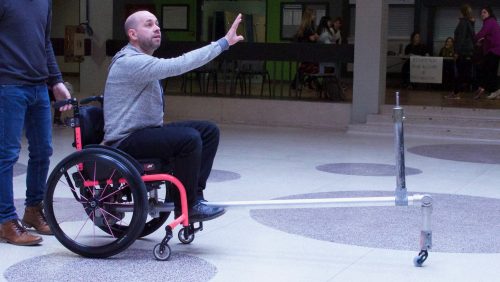
Download
Loading...
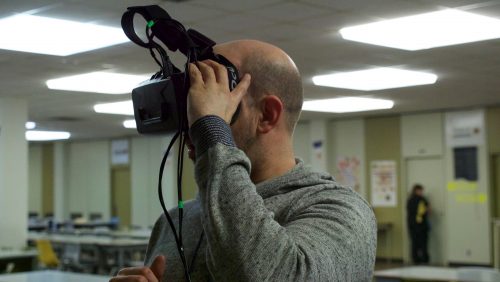
Download
Loading...
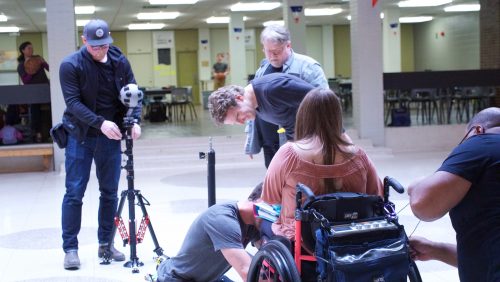
Download
Loading...
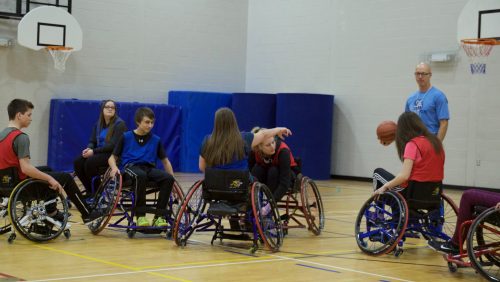
Download
Loading...
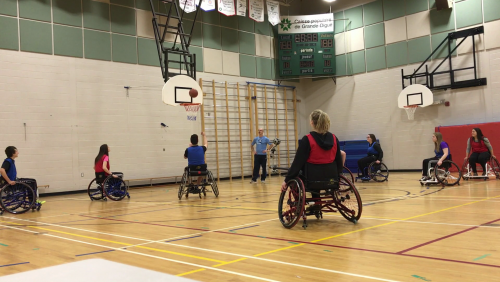
Download
Team
André Roy
Filmmaker
Photo
Jac Gautreau
Producer
Photo
Dominic Desjardins
Producer / Executive Producer
Photo
Photo : ONF
Credits
A film by
André Roy
Produced by
Jac Gautreau
Dominic Desjardins
With the participation of
Renelle Belliveau
Alyssa Belliveau
Rhéal Hébert
Karine Goguen
Researched, written and directed by
André Roy
Production Manager
Jean-Michel Vienneau
Director of Photography
Jake Beed
First Assistant Camera
Thor Henrikson
360˚ Video Capture
QuirkVR
Location Sound Recording
Dimitri Médard
Key Rigging Grip
Simon Doucet
Picture Editors
Jac Gautreau
André Roy
Original Music
François Émond, Les Productions du Pilier
© 2017 National Film Board of Canada (SOCAN)
Musician
François Émond
Off-Camera Performers
Danielle Toner
Martin Bourgeois
Spatial Audio Supervisor/Mixer
Matthew Chan
Dialogue Editor
Brent Pickett
Sound Effects Editor
Paul Germann
Foley Editor
Davi Aquino
Foley Artist
Goro Koyama
Foley Recording Mixer
Don White
Sound Edit and Mix Studio
Tattersall Sound and Picture
Foley Studio
Footsteps Post-Production Sound
Graphics Design, Stitching, Visual Effects
Redlab Digital
Transcription Services
Pro Documents
Thanks to:
Lynn and Marc Belliveau
All the staff of École Grand-Digue and Polyvalente Louis-J.-Robichaud
All Renelle and Alyssa’s friends for their participation in the basketball game
Studio team
Marketing Manager
Tammy Peddle
Administrator/Line Producer
Geneviève Duguay
Production Coordinator
Audrey Rétho
Legal Counsel
Peter Kallianiotis
Producers
Jac Gautreau
Dominic Desjardins
Executive Producer
Dominic Desjardins


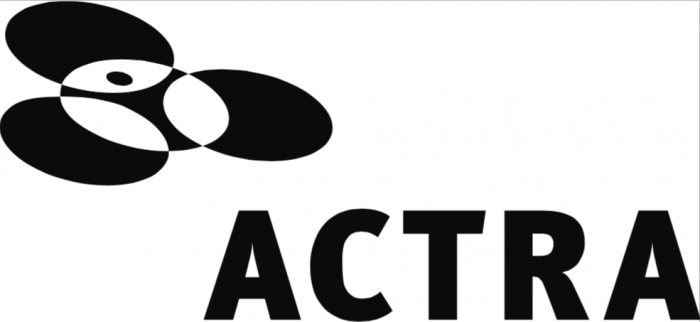

A production of The National Film Board of Canada
French Program
Canadian Francophonie Studio – Acadie
www.nfb.ca
© 2017 National Film Board of Canada
Media Relations
-
About the NFB
The National Film Board of Canada (NFB) is one of the world’s leading digital content hubs, creating groundbreaking interactive documentaries and animation, mobile content, installations and participatory experiences. NFB interactive productions and digital platforms have won over 100 awards, including 21 Webbys. To access this unique content, visit NFB.ca.